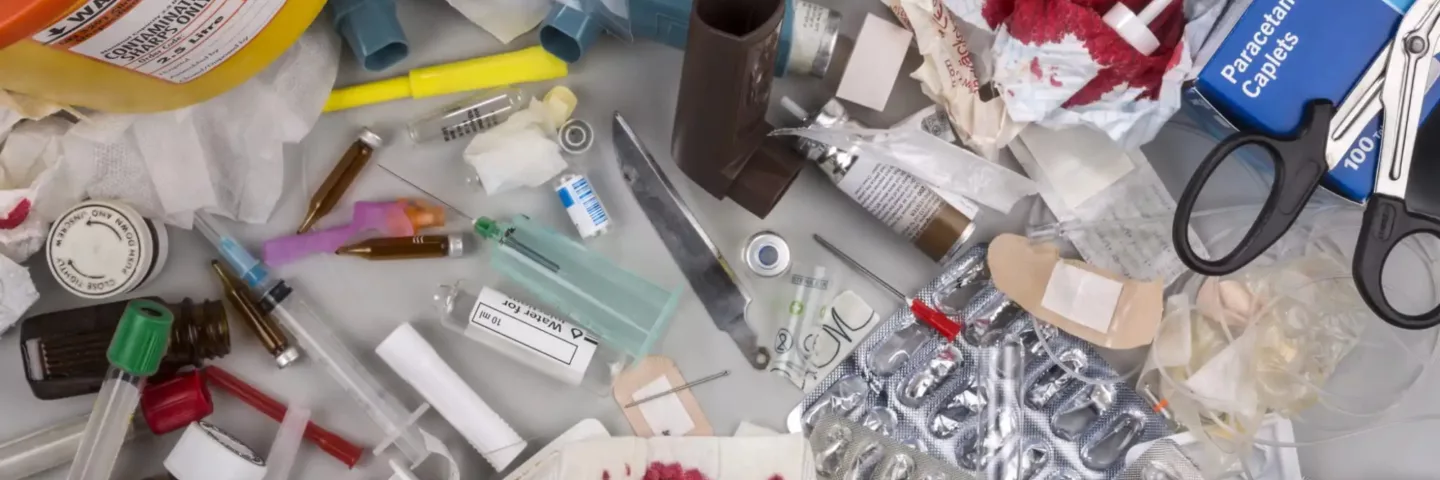EDITORIAL:
The recent Republic Policy News report detailing the sale of medical waste on the Islamabad “black market” is both concerning and indicative of a larger problem in Pakistan’s healthcare system. According to the report, a vendor hired by the Pakistan Institute of Medical Sciences (PIMS) to dispose of medical waste has been caught selling infectious material, such as discarded syringes and blood bags, with the help of hospital staff. The World Health Organisation warns that 15% of hospital waste is hazardous and can be infectious, toxic, and even radioactive, while the remaining 85% is non-hazardous. However, in Pakistan, where healthcare laws and regulations are weak, unscrupulous individuals may seek to profit by recycling hazardous materials for sale on the black market. Sadly, few healthcare providers in Pakistan follow international standards for waste management, leading to devastating consequences for patient welfare.
The careless disposal of medical waste has been attributed to high costs, ignorance, and a general disregard for patient safety. However, this lack of responsibility has had disastrous effects on public health. For example, the reuse of contaminated syringes is believed to have contributed significantly to the spread of blood-borne diseases such as hepatitis C throughout the country. This outcome is not surprising, given that many people in Pakistan prefer injections over regular medication, and doctors often oblige.
It is crucial to recognize that proper waste disposal is not only a matter of hygiene but also a matter of public safety. The sale of infectious materials on the black market poses a serious risk to public health, particularly in a country where infectious diseases are prevalent. Healthcare providers in Pakistan must adopt proper waste management practices, such as segregating hospital waste at the source and disposing of it appropriately, to prevent further harm.
The government also has a responsibility to enforce healthcare regulations and hold healthcare providers accountable for their waste management practices. Without proper regulation and oversight, unscrupulous individuals will continue to exploit the system for their gain, endangering public health in the process.
In addition to waste management, it is also necessary to address the root causes of the problem, such as the high costs of proper disposal and a lack of awareness of the dangers of improper waste management. Investing in public health education and providing resources for proper waste disposal can help prevent the sale of hazardous materials on the black market and promote safer healthcare practices.
The issue of medical waste management in Pakistan is a ticking time bomb that needs immediate attention. The recent revelation that medical waste generated by the Pakistan Institute of Medical Sciences (PIMS) is being sold in the “black market” is a symptom of a much larger problem. In a country where infectious diseases are rampant, the proper management of hazardous medical waste is crucial to prevent any adverse impact on public health and the environment.
It’s not just hospitals that generate medical waste; diagnostic laboratories, animal hospitals, blood banks, and collection service centres also produce tonnes of medical refuse every day. Unfortunately, incinerators are in short supply, not only in smaller towns and villages but also in major cities such as Lahore, Karachi, and the capital itself. The lack of proper management of healthcare waste, especially hazardous material, is a major concern.
The World Health Organisation (WHO) states that 15% of the waste generated by hospitals and other healthcare facilities is hazardous, toxic, and even radioactive. The remaining 85% is considered non-hazardous. However, in a country like Pakistan, where laws and administrative controls pertaining to healthcare are weak, unscrupulous elements try to make a quick buck by recycling hazardous material for sale in the black market. Very few healthcare providers follow the international medical practice of segregating hospital waste at the source and disposing of it properly. This carelessness has been put down to high costs, ignorance, and a general apathy towards patient welfare.
The reuse of contaminated syringes is a major contributor to the spread of blood-borne diseases like hepatitis C across the country. Unfortunately, many people prefer “injections” over regular medication, which doctors readily administer, contributing to the problem. This practice has disastrous consequences for public health.
It is essential to use sterile and disposable syringes to prevent the transmission of infections. Healthcare professionals must follow appropriate infection control practices to minimize the risk of transmission of blood-borne pathogens during medical procedures.
The preference for injections over regular medication is understandable, but it is crucial to emphasize the importance of using safe injection practices. Public health campaigns and education efforts can help raise awareness about the dangers of reusing syringes and the importance of using sterile and disposable needles.
Preventing the spread of blood-borne diseases requires a coordinated effort among healthcare providers, policymakers, and the general public. By promoting safe injection practices, we can reduce the transmission of blood-borne pathogens and improve public health outcomes.
Pakistan needs an appropriate and effective legal framework for medical waste management in accordance with international best practices, as well as trained human resources to ensure proper implementation.
Overall, the issue of medical waste management in Pakistan is a complex problem that requires a multifaceted solution. It is essential to prioritize public health and safety by enforcing healthcare regulations and investing in waste management practices and public education. Only then can we hope to mitigate the devastating consequences of improper medical waste disposal and ensure a healthier future for all Pakistanis.
Read more:
















